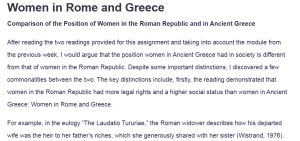Women in Rome and Greece
Comparison of the Position of Women in the Roman Republic and in Ancient Greece
After reading the two readings provided for this assignment and taking into account the module from the previous week, I would argue that the position women in Ancient Greece had in society is different from that of women in the Roman Republic. Despite some important distinctions, I discovered a few commonalities between the two. The key distinctions include, firstly, the reading demonstrated that women in the Roman Republic had more legal rights and a higher social status than women in Ancient Greece: Women in Rome and Greece.
For example, in the eulogy “The Laudatio Tururiae,” the Roman widower describes how his departed wife was the heir to her father’s riches, which she generously shared with her sister (Wistrand, 1976). Other things that women could do in the Roman Republic included engaging in business and they were given the freedom to participate in social events, such as social activities and religious events. This was not the case for women in Greece because there was no evidence that they could own property through buying or inheritance.
The second difference I observed is that in the Roman Republic, women had higher regard and were given more independence than those in ancient Greece. For example, the Roman widower praises his wife in the eulogy of when he was absent, and she had to take charge of their men so that they could defend their home, which was under attack. According to the eulogy, the wife successfully defended their home, with the men following her as the leader (Wistrand, 1976).
This high regard and respect is not evident in ancient Greece. While women were allowed in social occasions where they had some sort of influence, they only had a little esteem. Notably, they were not allowed in other public affairs that were important to society, like political meetings. Besides, women in ancient Greece seemed to be held in high regard only by other women who held lower rankings than them, like their servants.
A similarity found between the women in both societies is that their chastity and virtue were highly regarded, especially in maintaining the honor of the family and the stability of the community. The severe consequences of the rape of a noble Roman woman in “The Rape of Lucretia” are evidence of this (Livy, n.d.). In ancient Greece, women were expected to be modest even in public events, and their behavior also reflected their family’s honor. Notably, both of these societies were incredibly patriarchal, and as such, women bending to the will of men in the name of maintaining their virtue was the norm.
References
Livy. (n.d.). The Rape of Lucretia. Fordham University: The Internet Ancient History Sourcebook. https://sourcebooks.fordham.edu/ancient/livy-rape.asp.
Wistrand, E. (1976). Laudatio funebris quae dicitur Turiae [Funeral eulogy]. University of Grenoble. https://droitromain.univ-grenoble-alpes.fr/Anglica/Laudatio_Turiae_Wistrand.htm
ORDER A PLAGIARISM-FREE PAPER HERE
We’ll write everything from scratch
Question
Ancient Rome, like Ancient Greece, was a patriarchal society in which women were supposed to focus on domestic duties and played little role in politics. Two of our readings this week focus on the story of a real Roman woman (“The Laudatio Turiae”) and on a mythical, or highly mythologized, woman (“The Rape of Lucretia). Based on these two readings, and last week’s module, do you think the position of women in the Roman Republic was significantly different than in Ancient Greece (we can say Athens, to be specific)? Please use evidence from the texts in your response.

Women in Rome and Greece
THE READINGS:

